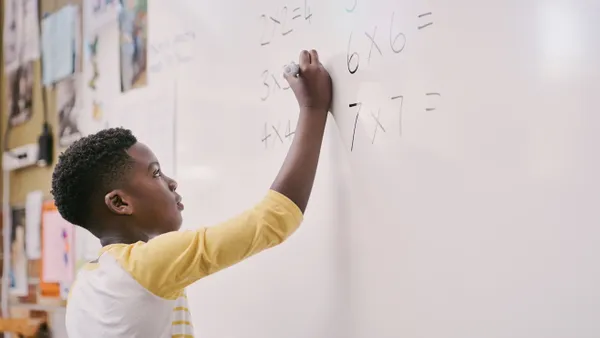Dive Brief:
- Online learning can create unique challenges for students, as they don’t have in-person signals such as bell schedules or classroom cues to help them stay focused and on track during the day, writes middle school language arts and social studies teacher Kasey Short for Edutopia. Short developed online tools to help her students organize their time and work even while they’re remote.
- To start, she posts a daily schedule — and includes the week ahead — to create structure and help them plan their time in advance by posting deadlines. She also organizes assignments in a clear, uniform way, so students can find material quickly and focus more on their work. Plus, she makes sure messages to students are clear, succinct and even bulleted.
- Short encourages her students to keep a materials and to-do list and make time during their day to organize email. Finally, she keeps parents and guardians informed about all assignments, along with materials their children will need for assignments ahead.
Dive Insight:
Executive functions, those skills students need as they move forward in their educations and careers, are also important when navigating online learning. Planning and organizing, for example, are especially important for students learning from home. They may need to track which days they’re online if they’re in a hybrid model and will have to meet deadlines, possibly without prompts, if they’re in asynchronous classes. And they may need to navigate connectivity issues and come up with a backup plan for getting online.
These soft skills can be difficult to learn, even when students are in-person in a classroom. And online learning can impede not only the development of, but the use of, executive functions as students can grow easily distracted by other activities online rather than their school work.
Trauma also can impact executive function, which many children may be experiencing given the effects of COVID-19, ranging from parents losing a job to knowing someone who has fallen ill to not seeing their friends.
There are ways, however, to help K-12 students not only strengthen executive functioning skills while they’re learning online, but even support their development. Parents, for example, can play a significant role by providing a place for children to work away from distractions, a first step to learning how to focus and stay on track.
Educators also can design class lessons that aren’t “overly demanding,” noted the Kennedy Krieger Institute, and simplify how much students need to keep track of to complete their work without having to constantly stop and refocus.
Finally, teachers can seed games and apps during online lessons, like those suggested by Common Sense Education. These can support elementary to high school students in building up a variety of tools from self-control to time management, and strengthen executive functioning skills they can use online or in-person.














